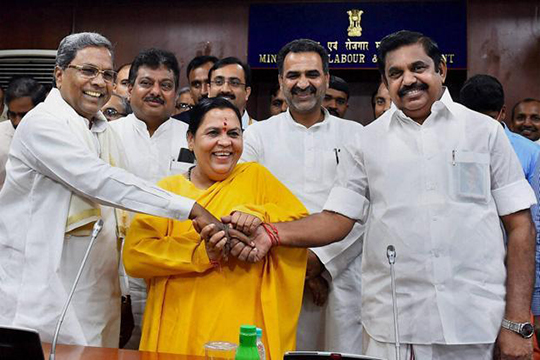New Delhi, Sep 29: A meeting convened by the Centre to iron out differences between Tamil Nadu and Karnataka on the impasse over Cauvery river water sharing failed to achieve any breakthrough today.

At the meeting convened by Union Water Resources Minister Uma Bharti, Tamil Nadu refused to accept Karnataka's proposal that an expert committee be sent to the river basin to assess water availability.
"There was a request from Karnataka government to our ministry to form an expert committee to take a view over availability of water in the Cauvery basin. The Karnataka Chief Minister (Siddaramaiah) pressed for it. Tamil Nadu could not give its consent to the proposal," Bharti told reporters after the meeting.
She said ultimately, solution could not be achieved outside the court. "Now things are again before the Honourable Supreme Court," Bharti, who chaired the meeting, said.
Besides Bharti and Siddaramaiah, Tamil Nadu PWD Minister Edappadi K Palaniswamy, chief secretaries of the two states, Union Water Resources Secretary Shashi Shekhar, and officials from Central Water Commission attended the nearly three-hour meeting.
Bharti said the Ministry noted views expressed by the two states during the meeting, convened after a Supreme Court order on Tuesday, and the same will be submitted before the apex court when it hears the matter tomorrow.
Referring to the tense situation in the two states, especially in Bengaluru, Mysore and Mandya-- the hotbed of Cauvery politics-- Bharti urged people to "take care of each other" and ensure peace.
"I may go on an indefinite hunger strike along the border between the two states, if the problem persists," Bharti said, making an emotional appeal.
Speaking to PTI after the meeting, Karnataka Chief Secretary Arvind Jadhav said his state insisted on a Central expert committee's visit to the basin area to study "ground realities, actual quantum of drinking water available and crop situation" before water was released as directed by SC.
"Before releasing water, we want a central team to come and visit the Cauvery basin and assess ground realities, look at the situation and the level of drinking water and crop situation. And whatever the central team says, we will abide by that," Jadhav said. He also said the Tamil Nadu government reiterated the long-standing demand for setting up a Cauvery Water Management Board.
"To this, our Chief Minister replied that there is a hearing scheduled before a court in this regard on October 11 and let the issues relating to formation of the board be decided then," Jadhav said.
Meanwhile, on Karnataka's demand for sending an expert team to the basin area, Shekhar stated there is no provision under law in this regard and that the SC order in the matter also does not speak about it.





Comments
Saffron dress turned into yellow. Is she having jaundice.
Add new comment